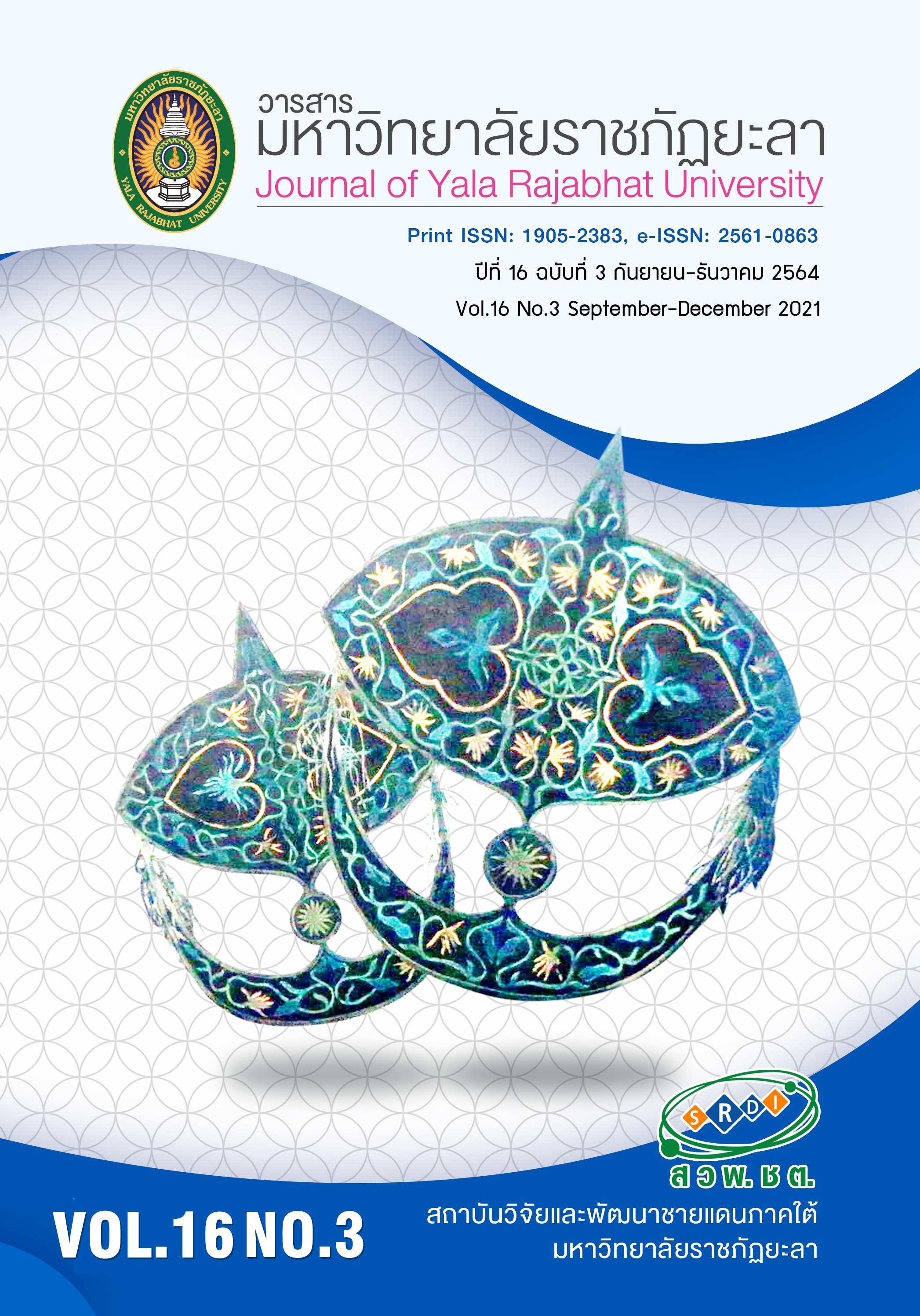The Development of English Morality Tale Series in Local Contexts to Improve English Reading Skills for Upper Elementary School Students in Yala Province
Main Article Content
Abstract
As English reading is an important fundamental capability for students to develop their learning abilities, this research was conducted to develop English morality tale series in local contexts to improve English reading skills for upper elementary school students in Yala province. The research procedure was divided into 4 stages: 1) identifying English learning problems and needs for developing English morality tale series, 2) developing English morality tale series, 3) testing the efficiency of English morality tale series, and 4) evaluating English morality tale series. 83 upper elementary school students were purposively selected as the subject in the efficiency testing stage. The instruments used in this study were English morality tale series in local contexts and an English reading proficiency test. The data were analyzed by using mean, standard deviation and percentage. The research findings revealed that English teachers and students required English tales that present daily stories related to their local contexts with the insertion of morality, ethics and exercises. As a result, 6 morality tales were developed under the title “English Morality Tale Series”, namely 1. Giving a Helping Hand, 2. Maintaining Discipline, 3. Living Frugally, 4. Loving Your Dwelling, 5. Being Honest and 6. My Great Diligence. The efficiency score of English morality tale series was 81.97/80.29. Furthermore, teachers and students’ opinions on English morality tale series were highly positive.
Article Details
Copyright Notice articles, information, images, etc. was published in this Journal of Yala Rajabhat University is a copyright of the journal Yala Rajabhat University. If any person or deparment wants to bring all or part of it for publish or take any action. Authorization is required in written form from the Journal of Yala Rajabhat University only.
References
Abdulsata, S., Piyawasan, S., Tohlong, A., Cheleng, S., Tehhea, I. & Samae, R. (2013). Development of multilingual reading promoting book series for beginners to develop communication skills in the three southern border provinces of Thailand. Al-Nur Journal of Graduate School of Fatoni University, 8(15), 1-12. (in Thai)
Best, J. W. (1977). Research in Education (3rd ed). New Jersey: Prentice Hall, Inc.
Bunparit, C. (2014). Using English tales in EFL classrooms. Journal of Humanities and Social Sciences, 20(1), 185-201.
Bloom, B. S. (1976). Human Characteristics and School Learning. New York: Mc Graw-Hill.
Brock, M. N. (1990). The case for localized literature in the ESL classroom. English Teaching Forum, 28(3), 22-25.
Chairoek, J., Jaiman, P. & Seubsom, K. (2019). The development of electronic storybook on reading comprehension skills in English for Prathomsuksa 6 students. Narkbhut Paritat Journal, Nakhon Si Thammarat Rajabhat University, 11(1), 117-126. (in Thai)
Jayyusi, S. H., Zughoul, M. R., Abul-Fattah, H. S., Duwaik, T. A., Al-Zubi, M., Abu- Sirhan. E., et al. (1991). English Language curriculum and its general guidelines for the basic education stage. Jordan: Ministry of Education.
Kashavarzi, A. (2012). Use of literature in teaching English. Procedia Social and Behavioral Sciences, 46, 554-559.
Kottong, K. & Chattiwat, W. (2008). The development of English reading exercises based on Asian folktales through the storyline method for Prathomsuksa 6 students of Banpao (Samranchaiwittaya) school, Chaiyaphumi province. Veridian E-Journal, Silpakorn University, 8(2), 2255-2270.
Khoohapinan, C. (1992). Reading and reading promotion. Bangkok: Sillapabannakarn Publishing. (in Thai)
Kreishan, R. A. & Saidat, A. M. (2011). The effect of the religious and cultural schemata on Jordanian students, comprehension of English texts. International Journal of Academic Research, 3(4), 38-347.
Madeeyoh, C. & Charumanee, N. (2013). The use of Islamic context texts to improve Muslim students’ English reading skills. Journal of Liberal Arts, Prince of Songkla University, 5(2), 46-58. (in Thai)
Mayusoh, S. & Karawee, P. (2014). English knowledge level of grade 6 students and current practices of teaching English in elementary schools under Narathiwat Primary Educational Service Area Office 2. The 24th TSU National Conference, May 21, 2014. Songkla: Thaksin University. (in Thai)
Ministry of education. (2008). Basic education core curriculum B.E. 2551 (A.D. 2008). Bangkok: The Agricultural Cooperative Federation of Thailand. (in Thai)
Office of the Basic Education Commission. (2019). OBEC policy 2019 [Online]. Retrieved September 22, 2019, from: https://www.obec.go.th/wpcontent/uploads/2018/10/OBECPolicy62.pdf. (in Thai)
Regional Education Office No.7. (2020). Primary 6 Ordinary National Educational Test Score, academic year 2015-2019 [Online]. Retrieved May 15, 2020, from: http://www.reo7.moe.go.th/reo8. (in Thai)
Sakolnakorn, P. N., Churngchaw, C. & Laeheem, K. (2017). Development of English learning in three southern border provinces. Journal of Education, Prince of Songkla University, Pattani Campus, 28(3), 24-36. (in Thai)
Sangkapan, J., Boonprakarn, K. & Krairiksh, W. (2015). Situations and problems in learning English at secondary schools affiliated with municipalities in the three southern border provinces. The 6th Hatyai National Conference, June 26, 2015. Hatyai: Hatyai University. (in Thai)
Sangkhapinyo, P. (2019). The problem of reading in Thai society: the educational system and supporting factors context. Journal of Humanities and Social Sciences, 12(1), 1-32. (in Thai)
Taylor, E. K. (2000). Using folktales. New York: Cambridge University Press.
Thongpradit, S. (2017). Needs in English reading skills practice and the development of reading materials with southern contexts. Master of Arts. Prince of Songkla University. (in Thai)


